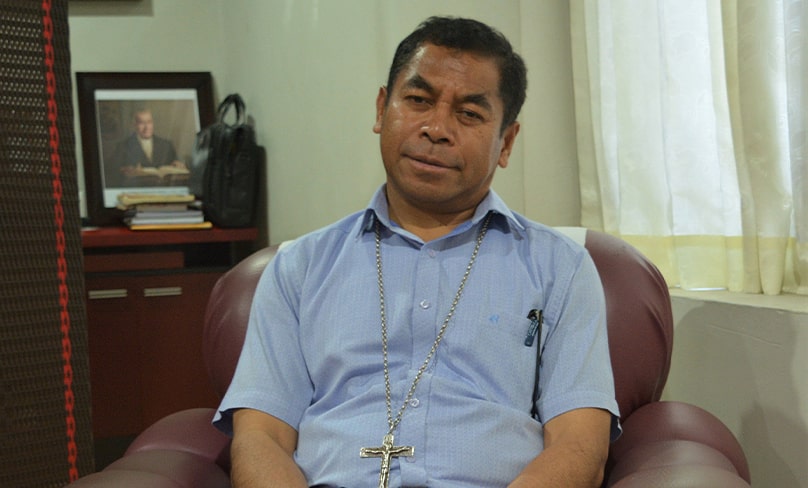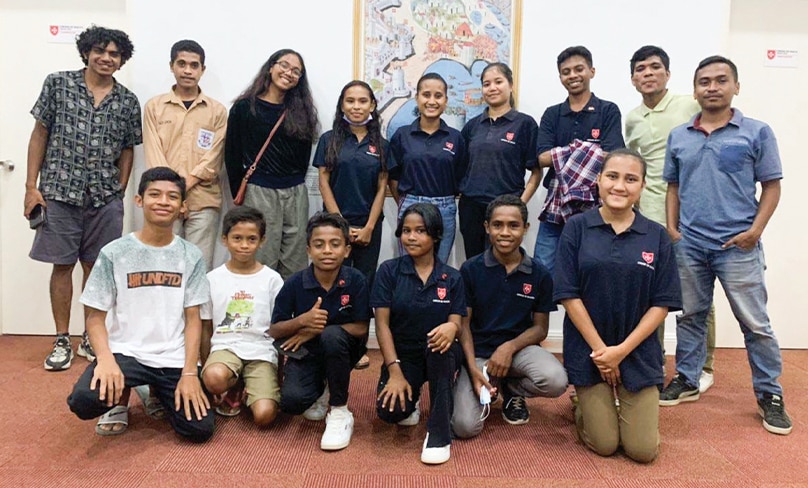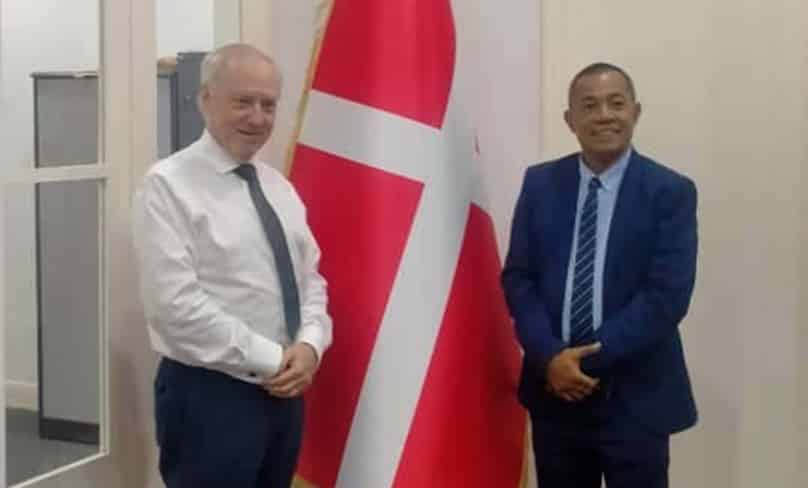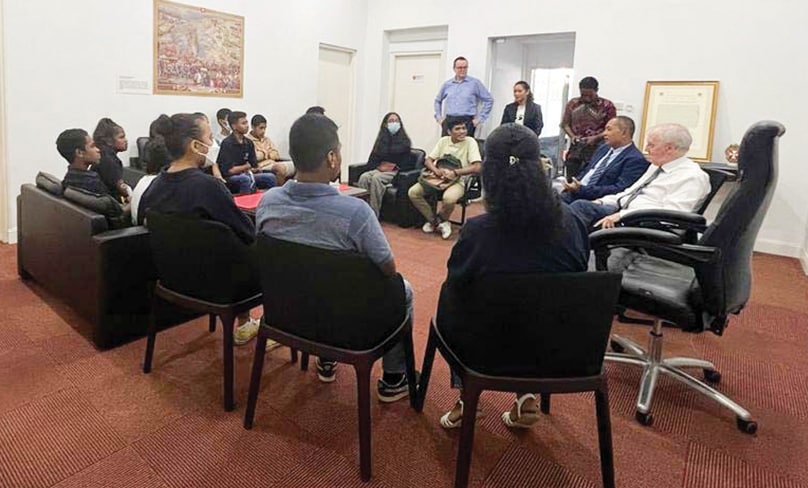
It was a week to remember in Timor-Leste. A week which began with a thanksgiving Mass at the Cathedral, a week when Jose Ramos-Horta was sworn in as the new president of Timor-Leste, the President of Portugal and the Governor-General of Australia received Timor-Leste’s highest award at a state banquet, a week for the nation to celebrate the 20th anniversary of the restoration of its independence with a military parade at the presidential palace, and the Foreign Minister to entertain over 30 ambassadors from around the world all of whom were in Dili for the celebrations.
It would be hard to justify a claim that the highlight of the week was a modest event hosted by the Order of Malta at our Embassy in Dili for 18 young people and eight volunteers of the Order, attended by the new Minister of Justice.
It would require some explaining. But let me try.
As a starting point, when he visited Australia in the 1980s, Pope St John Paul ll entered a gentle protest about how often people told him “This is a young country”. Partly a boast, partly an explanation, partly an excuse. However, he pointed out that the unified Italian state had been created in 1871. Only 30 years before Australia and who would call Italy a young country?
So it was a sobering experience to go to Timor-Leste in May and discover what a young country really looks like. Independence Day on 20 May celebrates the international recognition of the Democratic Republic of Timor-Leste just two decades before.
“I pray that those who have responsibility for life in East Timor will act with wisdom and goodwill towards all as they search for a just and peaceful resolution of present difficulties.”
When President Jose Ramos-Horta was sworn in as the newly-elected president, fittingly that ceremony took place late at night at Tasitolu, a vast open place where Pope St John Paul ll had come in 1989 on his first and only visit to this largely Catholic nation. He addressed a huge crowd there. His message of hope helped people in the often bitter struggle for independence from Indonesia.
It is worth repeating a passage from that speech:
“For many years now, you have experienced destruction and death as a result of conflict; you have known what it means to be victims of hatred and struggle… I pray that those who have responsibility for life in East Timor will act with wisdom and goodwill towards all as they search for a just and peaceful resolution of present difficulties. I pray for… a speedy improvement of conditions of life which will permit you to live in social harmony, according to your own traditions and requirements, in serene and fruitful productivity.”
In the ensuing decade things got much worse. Then in 1999 out of the blue President Habibie of Indonesia, the man who had ultimate responsibility for life in East Timor, did exactly what the Pope prayed for.
He acted with wisdom and goodwill towards all proposing a referendum on independence for Timor-Leste. Come August, and the people had voted overwhelmingly for independence. It took three more years to bring it to fruition.

But for a visitor to the capital Dili, more striking than the newness of self-government is the newness of the population.
Sixty percent of Timorese are under the age of 25. By comparison the figure in Australia is 30 per cent. And at the other end of the life cycle, only 4 per cent of the population is over 60 years of age compared to Australia’s 16 per cent.
This truly is a young country.
Thus the iron law of numbers decrees that the problems, the challenges and the hopes of the Timorese people are shaped by its youth. As will be the solutions.
So perhaps it would not be surprising were last-month’s visitors – at banquets, parades and speeches – to ponder the deeper meaning of the 20-year anniversary; and to discover that it was not just to be found in the official, the formal, the ceremonious.
“More than 40 school kids, and preschoolers, piled up the stairs to rub shoulders with Jose Ramos Horta, members of the government, the President of Portugal, more than 30 diplomats, the Pretender to the throne of Portugal, and all around immaculately turned-out military aides.”
It was to be found in the excited faces of children at the Presidential Palace. The newly installed president pointed the way during his formal address. He called up the children on the edges of the parade to join him on the reviewing stand.
More than 40 school kids, and preschoolers, piled up the stairs to rub shoulders with Jose Ramos Horta, members of the government, the President of Portugal, more than 30 diplomats, the Pretender to the throne of Portugal, and all around immaculately turned-out military aides.
They joined an impromptu guard of honour as the guests went for some refreshments at noon and Sir David Hurley was ushered out to catch his plane back to Canberra in time for the count in the Australian federal elections.
It was also to be found the next evening on the faces of 18 young students who were our guests at the Embassy of the Order of Malta.
The students were all present or past members of the Creating Leaders scholarship program begun in 2014 by the-then ambassador, David Scarf, to help pay for education in the poorest families.

Without that support, the children in those families would simply have had to leave school. (When Creating Leaders began, more than 8000 students a year aged 10 to 14 had to give up school and go to work. That challenge continues.)
At the embassy event, the youngest student was 11 and the oldest 22, from various schools and university.
The guest of honour was the newly sworn-in Minister of Justice HE Tiago Amaral Sarmento. After a hectic week, and deserving a rest, he booked the Saturday evening to come and meet the students.
When he addressed them, they listened to every word. He spoke Tetum, the main local language. Although some of us there did not speak a word of Tetum, for 20 minutes you knew from the faces of his listeners that he was laying out for them a vision of Timor-Leste. The meaning of that whole week could be read in their faces as unmistakably as in any text. The meaning of being a young country.
One of the group, Pascoal Amaral, had told us about being in the Creating Leaders program since starting as a 13 year-old.
“Although he has moved from his family home to Dili – closer to school and now to the university – he still could not afford the cost of transport out of his own pocket.”
Pascoal (main photo, second from right at back)comes from Viqueque which is 4.5 hours drive away from Dili on a good dry day. With wash-aways in the wet, it is inaccessible. He has seven siblings.
Both his parents work, earning in all $300 a month. Basic living costs take half of that. Without the funds provided by his Australian sponsors, Pascoal says he would have had no way of getting to school.
Although he has moved from his family home to Dili – closer to school and now to the university – he still could not afford the cost of transport out of his own pocket. Few of the poor families in rural areas could.
Throughout his secondary schooling, he boarded a truck early in the morning in Dili with other students heading out to the magnificent new Jesuit College of St Ignatius of Loyola at Kasait.
The new school replaced the original Jesuit school in Dili which has made way for the new Catholic University established by Archbishop Da Silva.

For a period, the Kasait school was headed by Father Quyen Vu SJ who is now the Australian Provincial of the Society of Jesus.
In Pascoal’s case, nine years after he began with the Creating Leaders program, he is completing his economics degree. He plans to go into business in the tourism sector. It helps that he speaks English and Portuguese, Indonesian and Tetum, and two more of the local Timorese languages.
When he was a 13-year-old starting out on the scholarship program, he had two special interests which he recorded on his profile: one was to master English and the other to become a businessman.
His sponsors over the years can share in his pride that he has achieved both. When he graduates at the end of the year, he is starting up a tour guide business with links to a Canadian operator to show Timor-Leste to overseas visitors.
Of the 15 young people at the embassy event, eight had gone through the scholarship program (they are known as finalistas) and seven are still at school in classes from year five through to year 10.
“She said it was from gratitude to the people who had helped her, the Australian sponsors and the Timorese volunteers.”
The finalistas were undertaking tertiary studies and undergraduate degrees in economics and medicine, law and engineering, health sciences and nutrition.
Just like Pascoal, each would have a story to tell. An engineer-in-the-making aiming for an internship in Japan; the law undergraduate planning to volunteer so she could do for other poor families what the sponsors and volunteers did for her; the medical student mulling over the challenges of being a doctor in Timor-Leste.
Amalia, the law student, (main photo, centre of back row) had the final word as she proposed the vote of thanks to the Minister, Manu Tiago.
She suddenly was overcome. She said it was from gratitude to the people who had helped her, the Australian sponsors and the Timorese volunteers. She wanted to do the same for the next generation.
So it was that on the final night of a week-long visit to Dili, the significance of being a young country really dawned.
There was even the slightest trace of a smile on the statue of St John Paul ll which welcomes the young people on the steps of their new Catholic University.
